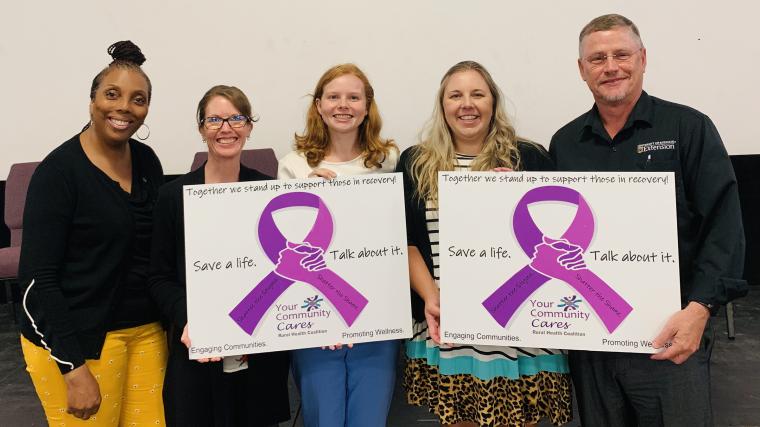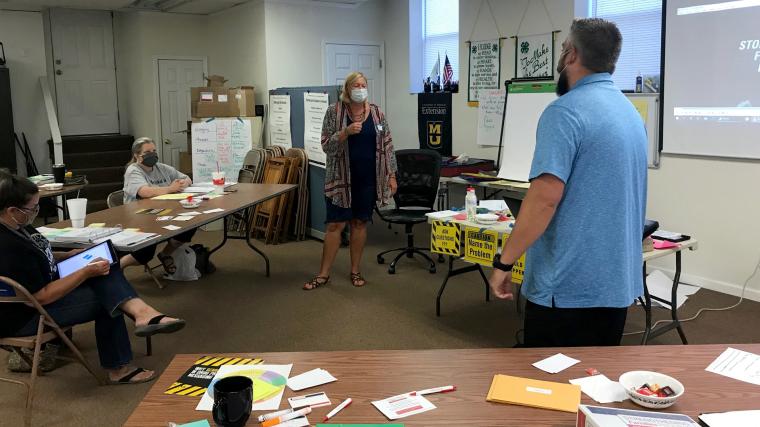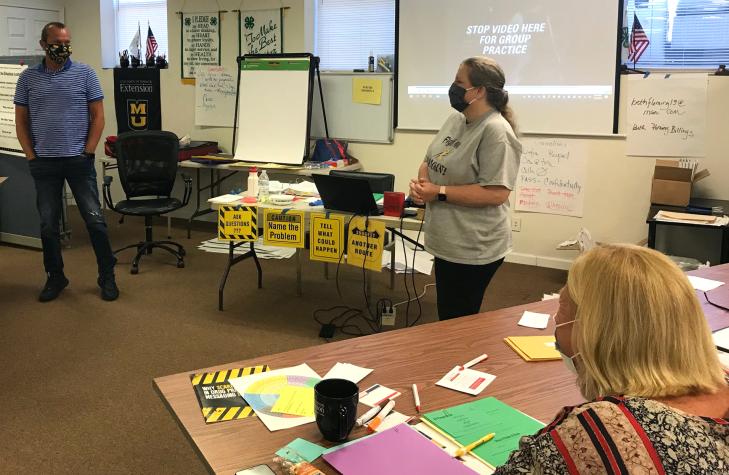A way to help rural communities, economies with their own kind of recovery.
COLUMBIA, Mo. – Opioid addiction keeps an estimated 1 million Missourians out of the workforce and costs the state about $1 million an hour, including the loss of jobs and wages. A new University of Missouri community health initiative will help rural communities counter the effects of the opioid crisis by focusing on local workforce recovery efforts, which could also help faltering rural economies.
The two-year Building Capacity for Recovery-Friendly Communities program will serve about 35,000 Missourians through MU Extension’s eight regions, aiding local efforts to become recovery-friendly communities and workplaces. The initiative is led by the MU Extension Community Health Engagement and Outreach Program in partnership with MU Extension Labor and Workforce Development, MU Center for Addiction Research and Engagement, and the Missouri Rural Health Association.
“We know the addiction crisis has deepened the distress and disinvestment felt in so many communities across Missouri,” said MU Vice Chancellor for Extension and Engagement Marshall Stewart. “This grant will create a model of hope, resilience and opportunity as we work together to help recovering workers, strengthen family supports and rebuild local economies.”
Many employers won’t take a chance on workers in recovery, perpetuating cycles of joblessness, addiction and despair. At the same time, baby boomers are retiring in record numbers, and there are not enough workers to replace them.
“The opioid crisis has exacerbated that gap even more, hurting rural areas and small towns particularly hard,” said Chiquita Chanay, principal investigator and MU Extension community health outreach specialist with the College of Human Environmental Sciences.
“A lot of organizations are working with prevention and treatment, but after that, what happens?” she said. “There are so many challenges that people in recovery face to stay sober. How do we get them back into the workforce? How do we support employers expanding their pool of workers and create a work environment that is recovery-friendly?”
The initiative is funded with a $1.1 million Rural Opioid Technical Assistance grant from the federal Substance Abuse and Mental Health Services Administration.
Along with nonprofit, government, business, school and addiction treatment and recovery experts and leaders, MU Extension will develop best practices, models and networks to guide effective efforts, said Kathleen Quinn, MU Extension senior program director for health and safety and MU School of Medicine associate dean for rural health.
To help target effective efforts, the MU Center for Applied Research and Engagement Systems (CARES) will help document the impact of other factors on substance abuse issues and workforce development needs.
CARES also will develop an assessment tool to help identify five communities for participation in PROSPER (Promoting School-community-university Partnerships to Enhance Resilience), an evidence-based model from Iowa State University that embeds life skills and community and family support efforts into the middle school curriculum. (See sidebar.)
The recovery-friendly workforce initiative emerged in 2019 when MU Extension convened an Opioids in the Workplace conference representing more than two dozen key stakeholders, including the Missouri Chamber of Commerce, labor organizations and the United Way.
“Everybody had identified these problems and was working on pieces of them, but this was an opportunity to bring everyone together to see how we could address these needs from both the workforce and workplace perspectives,” said conference organizer Doug Swanson, an MU Extension labor and workforce development specialist.
Later conferences in Crawford and Dent counties started with conversations to understand the scope of the challenges communities face due to opioid abuse.
“Especially in rural communities with dwindling workforces, we have to help business leaders and communities change their minds about addiction and recovery,” Swanson said. “How can we get people back in the workplace, in jobs with a livable wage, to help our communities thrive? This Building Capacity program will help us figure out ways to do that.”
Sidebar: Helping preteens PROSPER
A middle school in Fredericktown is the first in Missouri to pilot a life skills program recognized for its success in helping preteens become healthier adolescents and adults.
PROSPER (Promoting School-community-university Partnership to Enhance Resilience) is an evidence-based model developed at Iowa State University that embeds life skills and community and family support efforts into the middle school curriculum to help reduce youth substance use and other problem behaviors.
“The PROSPER model is based on school and extension partnerships,” said Shanna Sorg, MU Extension county engagement specialist in nutrition and health education serving Madison, Iron and Reynolds counties. “Every community has these two pillars. Let’s put them together and make them work for our families.”
In August, five Fredericktown middle school teachers, three MU Extension specialists and two other partners completed the three-day implementation training for PROSPER’s Strengthening Families program for youths age 10-14 and parents.
Sixth and seventh grade students will learn skills in communication, listening, resisting peer pressure, building positive self-esteem, resilience and more. Later this fall, parents and guardians will be invited to seven evening sessions that complement what their children have been learning in school.
“This middle school age is such an important development time and transition for children and their families,” Sorg said. “We’re excited to be able to bring this program to Missouri.”
This pilot will serve as the model for PROSPER programs in five more communities, funded through the $1.1 million grant from the federal Substance Abuse and Mental Health Services Administration for MU Extension’s Building Capacity for Recovery-Friendly Communities initiative, said Chiquita Chanay, principal investigator and MU Extension community health outreach specialist.
The MU Center for Applied Research and Engagement Systems will help identify the five communities through its data-mapping work on the social, economic and health determinants that contribute to the addiction epidemic.
Images available for this release:
Your Community Cares Rural Health Coalition leadership
“Together we stand up to support those in recovery!” was the key message at the 2019 conference in Salem, Missouri, working with local leaders to address the opioid epidemic. Pictured, from left, Chiquita Chanay, MU Extension community health outreach specialist; Kathryn Morgan, senior coordinator, MU Community Health Engagement and Outreach; Rachel Buenemann, county engagement specialist in nutrition and health education serving Dent, Phelps and Crawford counties; Felisha Richards with Your Community Cares Rural Health Coalition; and Doug Swanson, MU Extension labor and workforce development specialist.
PROSPER pilot training
Among those who attended PROSPER pilot training in Fredericktown in August were, from left, Audra Basti, middle school science teacher; Kelly Krokis, elementary school technology teacher, school bus driver and mayor of Fredericktown; Shanna Sorg, MU Extension county engagement specialist in nutrition and health education serving Madison, Iron and Reynolds counties; and Brandon Tull, member of the Fredericktown PROSPER implementation team.
PROSPER pilot training
From left, Brad Coleman, youth development specialist for Madison, Iron and Reynolds counties;Kelly Krokis, Fredericktown mayor, elementary school technology teacher and school bus driver; and Shanna Sorg, county engagement specialist in nutrition and health education serving Madison, Iron and Reynolds counties, practice facilitating interactions among sixth graders learning how to resist peer pressure.
Writer: Katherine Foran


